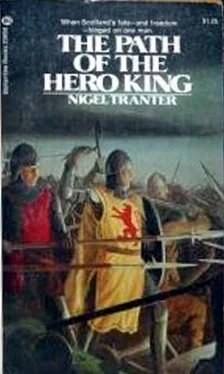There was a great sigh from the company, as all was now clear.
Man was to be prevented from becoming a conquest of Angus Ogs, and he was given much else, less strategically dangerous, instead.
The vital Sudreys were to be divided. It was seen why Randolph had been chosen for this venture, and created earl so suddenly-so that the Lord of the Isles could neither refuse to co-operate, nor insist on being in command over one of lesser rank. As Kings nephew, and an earl, Randolphs position would be safeguarded, and offence by Angus Og be made difficult.
It was apparent that the monarch had indeed been thinking, and to considerable effect.
Thereafter, Bruce went on to deal with matters tactical and organisation al in businesslike fashion, so that the atmosphere lost much of its tension and drama. Christina MacRuarie looked cynical -but then she often did.
The two expeditions would part company next day.
During the night, Edward Bruce took the opportunity to slip back across the Solway sands, at low tide and in darkness. He came on from Dumfries to rouse his brother, full of news, question, advice and demands.
The King, who did not relish Edwards headstrong presence in either expedition, informed him that he was taking most of his brothers men to Tynedale; but that he wanted him to go north, forthwith, and set up the inevitably prolonged sieges of Stirling Castle and Dundee. Edward was not enthusiastic, pointing out the wearisome and static nature of the tasks-to have pointed out to him in return that means might be found, as at Perth, to expedite that procedure. The other was, understandably, a little hipped over Perths fall-as he was about the Dumfries terms and surrender, after he had done all the work. He could hardly refuse the remit-but he took the opportunity to strike a blow for a concern of his own. Without actually framing it as a bargain, he indicated that he would tackle the task more enthusiastically if Robert would agree, as had been suggested on a number of occasions, to have him officially adopted as heir to the throne.
The King was careful, as in the past, not to commit himself. He would
consider it-but his daughters interests must not be overlooked, even
though she was a captive in England … Edwards vigorous exposition on
the follies of having a reigning queen on the throne of battling
Scotland-especially a young and absentee one-kept the King from his
sleep for considerably longer.
So, while a somewhat disgruntled Earl of Carrick headed north, and a not entirely contented Lord of the Isles took the new Earl of Moray and a great fleet southwest to the Isle of Man, the King of Scots personally led a light cavalry force of some 1,500 southeast into England, by the same route as before. And this time he pulled no punches. Ignoring the Vale of Irthing, which had not yet recovered from the assault of two years earlier, he made straight down Tyne, spreading fire and destruction. Hexham was of course his especial target; and after cutting down the still hanging bodies of his commissioners, he destroyed the town entirely-save for the Priory itself, which he left undamaged, although he appropriated all its silver and treasure that he could find. It seemed that Prior Thomas de Fenwick had been replaced by a younger man, one Robert de Whelpington, with instructions from Archbishop Greenfield of York to have no more truck with the Scots.
Bruce decided that the Archbishop required instruction also.
Setting up his base at Corbridge, downstream from Hexham, he subjected the South Tyne area to a systematic devastation such as even Wallaces 1297 invasion had not equalled. Then, with no major opposition materialising, he drove on southwards, not so much burning and harrying now as making demonstration and demanding tribute, payment for relief, and at high rates-and getting it. On to the very gates of Newcastle they pressed. But finding that strongly walled city too tough a nut to crack quickly, they by-passed it, availing the Teame valley instead, with rich reward. Then on to Durham itself.
They were now nearly a hundred miles deep into England, and Bruce was growing a little anxious. His scouts gave him no intimation of any large enemy force being mustered against them; but if any were being raised in the west, he could be all too easily cut off from home. He decided that Durham-or at least, Hartlepool, where he had family lands whose revenues had long been denied him-was as far as he dared go on this occasion; York must wait And, woefully, his wife Elizabeth, seventy miles farther than York, must wait also.
Bishop Kellew of Durham, successor to the late and unlamented Beck, was away at a parliament in the south, and his great castle on its rock safe from all but prolonged siege. But the rich city itself was vulnerable; and after some part of it was reduced to ashes, its chief citizens were urgent to persuade Bruce to accept an immediate 2,000 merits, with promises of a total of 5,000, and hostages to ensure payment. With the humiliating rider that they must agree to provide free ingress and egress through the County Palatine whenever the King of Scots chose to invade England, Bruce accepted their terms for one years protection. The fact that it was the Prince-Bishops land, and largely his money also, was the best of it.
The King turned for home not dissatisfied, the Scots Treasury in a better state, by a total of nearly 40,000, pounds than it had been for many a year, the county authorities of Northumberland, Cumberland and Westmorland each having agreed to pay 2,000 pounds over and above their constituent places, for a years peace.
The Scots reached the Border area without interception; but Bruces luck changed nevertheless, and the last stages of that ride were something of a personal nightmare. Sickness struck him, of the same variety that he had suffered at Inverurie six years before, brought on no doubt by the same causes-lack of rest and proper feeding, plus the hard and insanitary conditions of continuous campaigning. Once again fever, vomiting, skin-rash and intolerable itch was his lot, with ever-increasing weakness. But now he had to continue to ride.
Possibly his sickness was basically responsible for the second misfortune.
His advance party was attacked and badly cut up by a company out from the Carlisle garrison, in the Haltwhistle area; and just because the King was only too well aware of the hindrance he had become to his people, he agreed to fierce demands for retaliation on the fortress of Carlisle itself, to which he probably never would have listened in less fevered state. In the event, the typical secret night attack was repulsed with serious losses, a barking dog alarming the guards, and the main garrison rallying swiftly. It was a sobered and reduced company which recrossed the Border line at length, with their semi-delirious monarch demanding to be taken to Jamie Douglass camp at the siege of Roxburgh Castle.
Bruce was not aware of his arrival at Roxburgh, where Teviot joined
Tweed; nor of the loving care he received en route or at Douglass
hands. And only dimly aware of the hot summer weeks that followed,
while he lay helpless, and of the succession of his friends who came
sorrowfully from far and near to visit him. At some stage he realised
that Christina MacRuarie was back, nursing him, but did not know that
it was for Elizabeth de Burgh that he constantly moaned and cried-with
whom sometimes he believed that he gripped in his arms-thereby
twisting a sharp knife in the Highlandwomans heart Strangely enough,
it was his brother again who really set him on the road to recovery, a recovery of the spirit primarily, rather than of the body. For in August Edward came in triumph to Roxburgh, thinking to cheer the King into health by the tale of his successes.
Читать дальше












